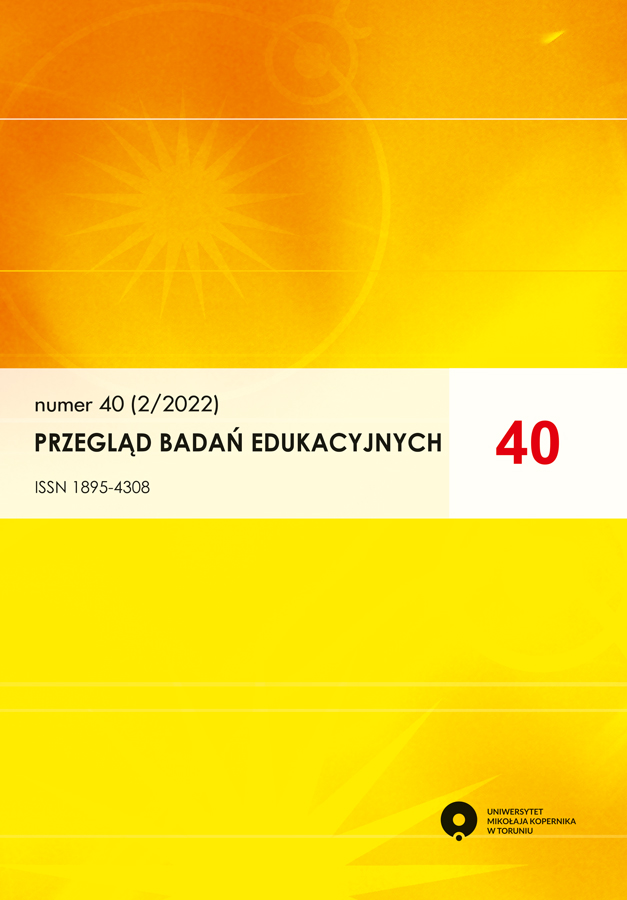Mental Resilience of Polish Adolescents During the COVID-19 Pandemic in 2021
DOI:
https://doi.org/10.12775/PBE.2022.027Abstract
Introduction. As reported in the literature, the severity of anxiety and depression symptoms in students due to social isolation during the COVID-19 pandemic prompted research on the psychosocial resources of adolescents, which was revealed in the form of resilience. Research Aim. Answers were sought to three research questions concerning: a) the resilience of Polish adolescents during the pandemic in 2021, b) the differentiation within the measured components of resilience, and c) the comparison of resilience between female and male students. Method. The electronic version of the Polish Mental Resilience Scale (SPP-18), standardised in the group of Polish adolescents and teenagers aged 12–18, was used for the online assessment of n = 263 students (F = 137; M = 126) aged 12–16. Results. The analysis of the students’ responses indicates the raised level of their resilience in the pandemic (7/10 in standard ten), differentiation within the components with the highest score for the sense of humour and the lowest for negative affect tolerance. Differences in the level of resilience due to gender were statistically insignificant, although the results of girls were slightly higher in all dimensions compared to those of boys. Conclusion. The raised level of resilience in the assessed sample seems optimistic, especially with respect to the majority of the students (about 70%). However, about 10% of the students in each of the 18 items declared low personal resilience competencies. Such groups of adolescents should be looked after, and if possible, periodically re-assessed to observe the changes in their level of resilience over time.
References
Active Minds (2020). Students’ Mental Health Survey-September2020. Retrieved: 4 January 2022 from: https://www.activeminds.org/wpcontent/uploads/2020/10/ Student-Mental-Health-Data-Sheet-Fall-2020-1.
Ahern, N., Kiehl, E., Sole, M., & Byers, J. (2006). A Review of Instruments Measuring Resilience. Issues in Comprehensive Paediatric Nursing, 29, 2, 103–125, doi: 10.1080/01460860600677643.
Borucka, A. (2011). Koncepcja resilience. Podstawowe założenia i nurty badań [The Concept of Resilience. Basic Assumptions and Currents of Research]. In: W. Junik (Ed.), Resilience. Teoria – badania – praktyka [Resilience. Theory-Research-Pactice] (pp. 11–28). Warszawa: Wydawnictwo Edukacyjne Parpamedia.
Chuang, S., Lamb, M., & Hwang, C. (2006). Personality Development from Childhood to Adolescence: A Longitudinal Study of Ego-Control and Ego-Resiliency in Sweden. International Journal of Behavioral Development, 30, 4, 338–343, doi: 10.1177/0165025406072795.
Giménez-Dasí, M., Quintanilla, L., & Fernández-Sánchez, M. (2021). Longitudinal Effects of The Pandemic and Confinement on The Anxiety Levels of A Sample of Spanish Children in Primary Education. International Journal of Environmental Research and Public Health, 18, 24, 13063, doi:1660-4601/18/24/13063.
Hernandez-Martinez, P., & Williams, J. (2013). Against the Odds: Resilience in Mathematics Students in Transition. British Educational Research Journal, 39, 1, 45–59, doi: 10.1080/01411926.2011.623153.
Junik, W. (2011). Zjawisko rezyliencji – wybrane problemy metodologiczne [The Phenomenon of Resilience – Selected Methodological Problems]. In: W. Junik (Ed.), Resilience. Teoria – badania – praktyka. [Resilience. Theory-Research-Practice], (pp.47-66). Warszawa: Wydawnictwo Edukacyjne Parpamedia.
Knopik, T., & Oszwa, U. (2019). Self-Determination and Development of Emotional and Social Competences and The Level of School Achievements in 10–11-YearOld Polish Students. Education, 3–13, doi: 10.1080/03004279.2019.1686048.
Lee, C., & Johnston-Wilder, S. (2010). Mathematical Resilience. Mathematics Teaching, MT218, 38–41. Retrieved 10 January 2022 from: http://www.atm.org.uk/ journal/archive/mt218.html.
Lee, J. (2020). Mental Health Effects of School Closures During COVID-19. The Lancet, 4, 421, doi: 10.1016/S2352-4642(20)30109-7.
Luthar, S.S., Cicchetti, D., & Becker, B. (2000). The Construct of Resilience: A Critical Evaluation and Guidelines for Future Work. Child Development, 71(3), 543–562, doi: 10.1111/1467-8624.00164.
Luthar, S.S. (2006). Resilience in Development: A Synthesis of Research Across Five Decades. In: D. Cicchetti, & D.J. Cohen (Eds.), Developmental Psychopathology: Risk, Disorder, and Adaptation (pp. 739–795). John Wiley & Sons, Inc.
Masten, A. (2001). Ordinary Magic: Resilience Processes in Development. American Psychologist, 56(3), 227–238, doi: 10.1037/0003-066X.56.3.227.
Niemiec, C., & Ryan, R. (2009). Autonomy, Competence, and Relatedness in the Classroom: Applying Self-Determination Theory to Educational Practice. Theory and Research in Education, 7, 2, 133–144; doi:10.1177/1477878509104318.
Ogińska-Bulik, N., & Juczyński, Z. (2011). Prężność u dzieci i młodzieży: charakterystyka i pomiar – polska skala SPP-18 [Resiliency in Children and Adolescents – Characteristic and Measurement- Polish Scale SPP-18]. Polskie Forum Psychologiczne, 16, 1, 7–28.
Oszwa, U. (2020). Lęk przed matematyką – poglądy, badania, rozwiązania [Math Anxiety – Theory, Research, Solutions]. Lublin: Wydawnictwo UMCS.
Oszwa, U., Domagała-Zyśk, E., & Knopik, T. (2017). Zasoby odpornościowe uczniów w środkowym wieku szkolnym a ryzyko niedostosowania społecznego [Resilience Resources of Middle-School-Aged Students and the Risk of Social Maladjustment]. Ruch Pedagogiczny, 1, 91–104.
Santomauro, D. (2021). Global Prevalence and Burden of Depressive and Anxiety Disorders in 204 Countries and Territories in 2020 Due To the COVID-19 Pandemic. The Lancet, 398, 10312, P11700–1712; doi: 10.1016/S0140- 6736(21)02143-7.
Sikorska, I. (2016). Odporność psychiczna w okresie dzieciństwa [Mental Resilience in Childhood]. Kraków: Wydawnictwo UJ.
Spielberger, C.D. (2006). Cross-Cultural Assessment of Emotional States and Personality Traits. European Psychologist, 11(4), 297–303, doi: 10.1027/1016- 9040.11.4.297.
Wrześniewski, K., Sosnowski, T., & Matusik, D. (2002). Inwentarz stanu i cechy lęku STAI. Polska adaptacja STAI. Podręcznik [STAI State and Trait Anxiety Inventory. Polish Adaptation of the STAI. Manual]. Warszawa: Pracownia Testów Psychologicznych PTP.
Wu, S., Zhang K., Parks-Stamm, E., Hu, Z., Ji, Y., & Cui, X. (2021). Increases in Anxiety and Depression During COVID-19: A Large Longitudinal Study from China. Frontiers in Psychology, 12, 2716, doi: 10.3389/fpsyg.2021.706601.
Yeager, D.S., & Dweck, C.S. (2012). Mindsets that Promote Resilience: When Students Believe that Personal Characteristics Can Be Developed. Educational Psychologist, 47(4), 302–314, doi: 10.1080/00461520.2012.722805.
Downloads
Published
How to Cite
Issue
Section
License
Copyright (c) 2023 Urszula Oszwa

This work is licensed under a Creative Commons Attribution-NoDerivatives 4.0 International License.
Stats
Number of views and downloads: 504
Number of citations: 0



